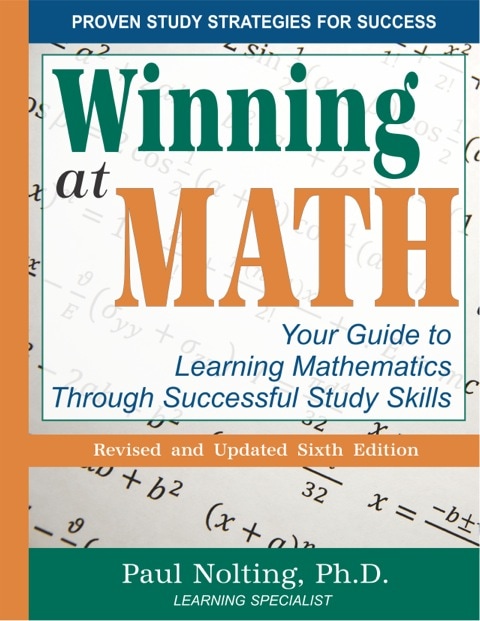Dr. Paul Nolting's Academic Success Press Blog: A Publication Dedicated to Math Success |
DR. PAUL NOLTING'S ACADEMIC SUCCESS PRESS BLOG
Thoughts on "Instructional Delivery in Developmental Mathematics" by C.A. Zavarella and J.M Ignash10/14/2015 Hello! Happy Wednesday! As our regular readers know, we typically use this day's post to bring attention to various research and field studies published in major developmental learning journals roughly during the past five years. Today, we have chosen to focus on "Instructional Delivery in Developmental Mathematics" by C.A. Zavarella and J.M. Ignash (published in The Journal of Developmental Education in 2009).
In this extremely fascinating article, Zavarella and Ignash present a quantitative study, which aims to measure the probability of student withdrawal from computer-based developmental math courses in comparison to that of traditional lecture-based courses. According to the study’s authors, students tested were more likely to withdraw from computer-based courses than traditional courses, usually after citing “personal reasons” on exit exams. The authors are out to answer a number of questions with this study. First, they want to know whether a relationship exists between students’ learning styles and their completion or withdrawal from developmental math courses. Second, they want to determine whether the motivations for taking a particular course in a particular format play a significant role in the eventual withdrawal process. Third, they want to explore the relationship between College Placement Test scores and withdrawal rates. The study followed three groups of students: a, 69 students enrolled in three sections of traditional lecture courses; b, 67 students enrolled in hybrid courses; and c, 56 students enrolled in three sections of distance learning courses. The authors collected data from a learning styles inventory each of these students took, as well as from an institutionally developed survey, which asked students for the reasons they decided to take certain courses. Finally, they tapped into their test institution’s CPT database for information on placement scores. Ultimately, the study showed dropout rates were much higher for hybrid and distance learning students. Approximately 42% of the test subjects dropped hybrid courses, while 39% dropped an online course. Only 20% dropped their lecture course. This happened, the authors argue, because many of these courses “presented challenges [students] did not expect.” More than 50% of the students who dropped a computer-based course implied that they did not fully understand “what it takes to learn mathematics in a computer-based format.” Our own thoughts on this: This particular study is intriguing, as it largely corroborates our own research on the topic. More often than not, when students drop online courses, they say something along the lines of “I thought it would be easier and less time consuming.” With this in mind, we recommend that institutions create a two-way channel of communication between themselves and their students. Students must understand the unique challenges of online courses. For more, please see: Zavarella, C.A., Ignash, J.M. “Instructional Delivery in Developmental Mathematics: Impact on Retention.” Journal of Developmental Education, Volume 32, Issue 3, Spring 2009. Pages 2-13.
1 Comment
10/14/2022 12:36:02 pm
anks for sharing the articlesc, and more importantly, your personal experience of mindfully using our emotions as data about our inner state and knowing when it’s better to de-escalate by taking a time out are great tools. Appreciate you reading and sharing your story since I can certainly relate and I think others can to
Reply
Leave a Reply. |
AuthorDr. Nolting is a national expert in assessing math learning problems, developing effective student learning strategies, assessing institutional variables that affect math success and math study skills. He is also an expert in helping students with disabilities and Wounded Warriors become successful in math. He now assists colleges and universities in redesigning their math courses to meet new curriculum requirements. He is the author of two math study skills texts: Winning at Math and My Math Success Plan. Blog HighlightsAmerican Mathematical Association of Two-Year Colleges presenter, Senior Lecturer-Modular Reader Contributions
|
Proudly powered by Weebly

 RSS Feed
RSS Feed